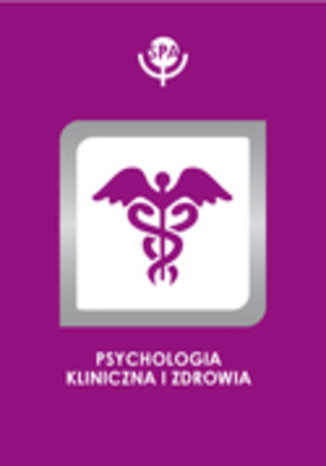Array
(
[id] => 424
[date] => 2019-03-14
[doi] => 10.14691/CPPJ.24.1.79
[title] => Rola emocji w relacji sprężystość psychiczna – radzenie sobie w sytuacji choroby dziecka
[title_en] => THE ROLE OF EMOTIONS IN THE RELATION BETWEEN EGO-RESILIENCY AND COPING STRATEGIES IN THE SITUATION OF CHILD’S ILLNESS
[authors] => Paula Dobaczewska, Ewa Gruszczyńska, Jolanta Życińska, Maciej Januszek
[abstract] => The aim of the study was to evaluate the mediation effect of negative and positive emotions in the relation between personality trait called ego-resiliency and strategies to cope with prolonged intense stress experienced by mothers of children with oncological disease. The study participants consisted of 70 women with a mean age of 37 (SD=8.25), mothers of children treated for bone, brain or lymphatic system cancer. We used three research tools: Ego-Resiliency Questionnaire (Block, Kremen, 1996), Emotional State Questionnaire in the context of cognitive assessment of stressful situation (Heszen, Januszek, Gruszczyńska, 2001) and Coping Questionnaire (Gruszczyńska, Knoll, 2015). The mediation effect of positive and negative emotions in relation between ego-resiliency and coping strategies was tested by using two complementary approaches: bootstrapping procedure for the multiple mediator model and nested models comparison method. It was found that based on the analysis the statistics between the ego-resilience and positive emotions (.19) and negative emotions (.11) are insignificant. Negative emotions do not explain the coping (-.08). A similar path of positive emotions is important, but the influence is very weak (.22). In the analyzed model, coping was explained only by the direct impact of ego-resilience (.49). All introduced variables explain jointly 36% of the variation. Due to the fact that emotions considered as part of cognitive stress-related action are not mediators between ego-resiliency and coping, one should check whether the emotions as a result of the stress- related action could have such a function.
[abstract_en] => The aim of the study was to evaluate the mediation effect of negative and positive emotions in the relation between personality trait called ego-resiliency and strategies to cope with prolonged intense stress experienced by mothers of children with oncological disease. The study participants consisted of 70 women with a mean age of 37 (SD=8.25), mothers of children treated for bone, brain or lymphatic system cancer. We used three research tools: Ego-Resiliency Questionnaire (Block, Kremen, 1996), Emotional State Questionnaire in the context of cognitive assessment of stressful situation (Heszen, Januszek, Gruszczyńska, 2001) and Coping Questionnaire (Gruszczyńska, Knoll, 2015). The mediation effect of positive and negative emotions in relation between ego-resiliency and coping strategies was tested by using two complementary approaches: bootstrapping procedure for the multiple mediator model and nested models comparison method. It was found that based on the analysis the statistics between the ego-resilience and positive emotions (.19) and negative emotions (.11) are insignificant. Negative emotions do not explain the coping (-.08). A similar path of positive emotions is important, but the influence is very weak (.22). In the analyzed model, coping was explained only by the direct impact of ego-resilience (.49). All introduced variables explain jointly 36% of the variation. Due to the fact that emotions considered as part of cognitive stress-related action are not mediators between ego-resiliency and coping, one should check whether the emotions as a result of the stress- related action could have such a function.
[keywords] => coping with stress, emotion, ego-resiliency, psycho-oncology
[keywords_en] => coping with stress, emotion, ego-resiliency, psycho-oncology
[file_path] => /files/articles/2018-24-rola-emocji-w-relacji-sprysto-psychiczna-radzenie-sobie-w-sytuacji-choroby-dziecka.pdf
[okladka] => psychologoia_kliniczna_i_zdrowia.jpg
[rocznik] => Rocznik: 2018 Tom: 24 Numer: 1
[strony] => 79-86
)










 Pobierz pełny tekst
Pobierz pełny tekst



